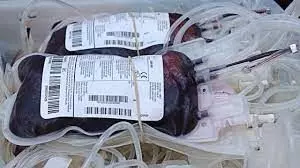
Ag Director-General, National Blood Service Commission (NBSC), Dr Omale Amedu, on Thursday decried the great deficit in Nigeria blood bank.
Amedu said this at the commencement of nationwide sensitisation on NBSC mandate in Abuja.
He said that the Nigeria blood bank has very great deficit and would not carter for the needs of over 200 million population.
According to him, Nigeria's large population requires availability of safe blood and blood products for emergency use.
"There is a great deficit in blood bank that we have currently.
"Having a population of over 200 million Nigerians, we are expected to have a minimum of two million safe blood units per annum, but as I speak to you we have only about 25,000 safe blood units in our record.
"So we really need Nigerians to volunteer blood freely because you never can tell, who needs blood, we need to be prepared," he said.
Amedu said frequent donation of blood revitalised the body system, improved health status of the donor due to the clinical check-up and saved lives.
He said the flag-off of the sensitisation on NBSC mandate was to further ensure the regulation, coordination and provision of safe, quality blood and blood products nationwide.
"Our target is to increase blood units collected from voluntary non-remunerated donors and sensitise Nigerians on the one million Safe Blood Units Initiative (OMSBUI).
"Such that blood units collected will increase from 25,000 to one million by 2023 and three million by 2030," he said.
Also, Dr Adeze Oreh, Head of Planning, Research and Statistics, NBSC, said the expected outcome of the sensitisation exercise would achieve Universal Health Coverage (UHC) and Sustainable Development Goals (SDGs).
Oreh said that it would also enhance citizens access to safe blood, gain perspective on the role of multi-sector stakeholders in strengthening blood transfusion value chain.
Dr Osagie Ehanire, the Minister of Health, said there was need for more sensitisation and mobilisation of citizens to embrace blood donation as a responsibility of all.
According to him, blood donation saves lives.
Ehanire was represented by Dr Chris Isokonwe, Senior Special Technical Assistant in the ministry.
He also called on stakeholders to ensure safe, quality provision of necessary blood and products for the good of all in Nigeria.



